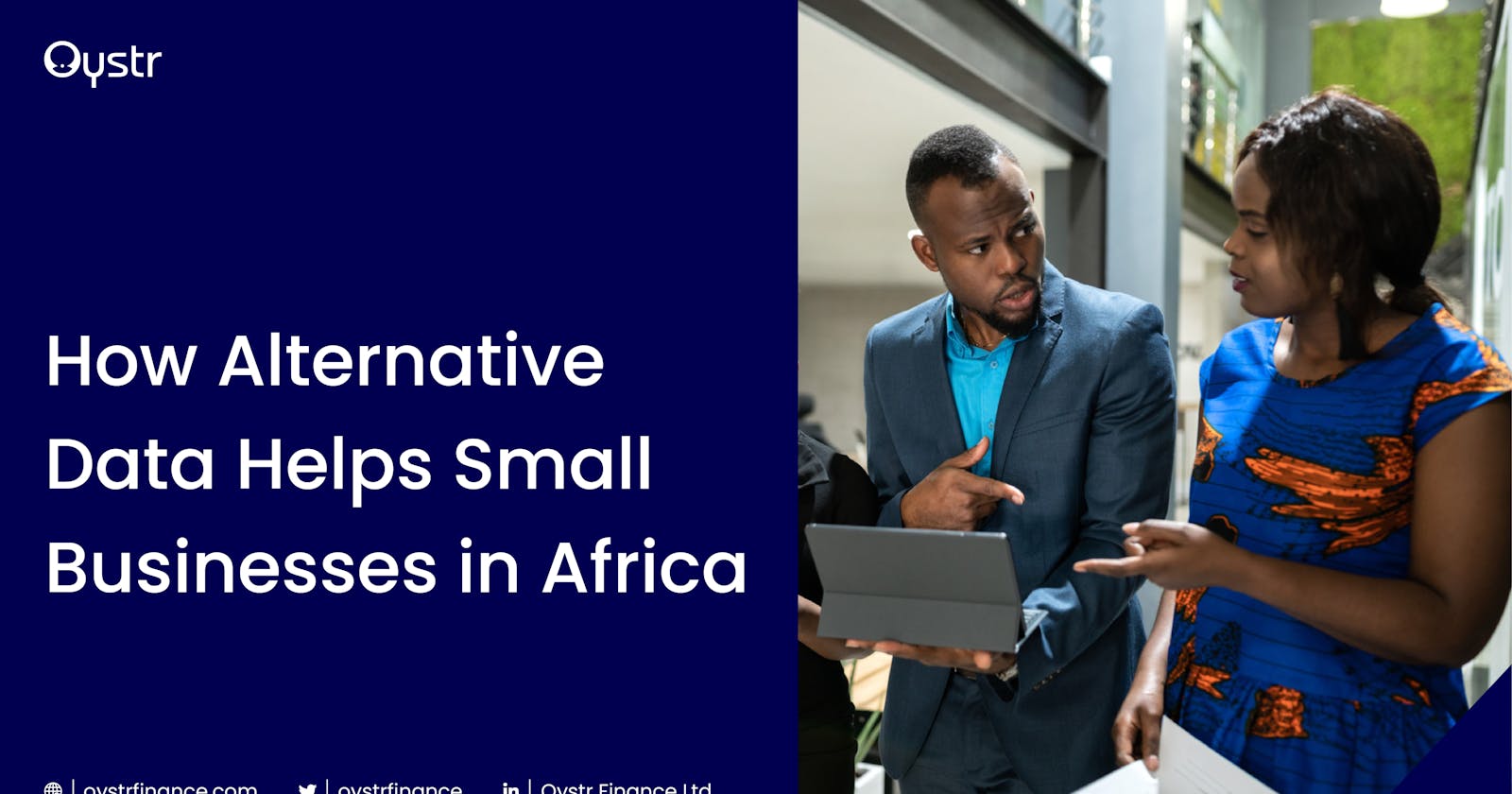Small businesses contribute significantly to economic growth in Africa. In Sub-Saharan Africa, theforty-four million micro, small and medium enterprises provide approximately eighty percent of jobs in the continent.
The growth of these small businesses, which are the bedrock of developing economies, affects the financial system positively. However, these integral enterprises face significant hurdles in access to financing.
The International Finance Corporation (IFC) valued the deficit in funding for SMEs in Africa at $331 billion before the COVID-19 pandemic. Presently, more than half the total population of small businesses on the continent need more than the funding they have access to. And this is largely attributed to reluctance by financiers, including traditional institutions like banks. More so, this reluctance results from the deficit of adequate data.
However, tech-inclined SME lenders discovered the feasibility of harnessing alternative data to provide small businesses with funding access. Banks and other traditional institutions also see the opportunity inherent in alternative data for serving SMEs.
Benefits of Alternative Data for Small African Businesses
Across finance, alternative data unravel novel and unique opportunities for better, more accessible and more inclusive operations. Data has the potential to improve decision-making and enhance daily operations for businesses. However, traditional data does not adequately provide the kind of information required in the currently fast-paced, futuristic, real-time, data-driven world.
Fortunately, the tech-savvy generation generates increasingly large amounts of data from intensified digital adoption and usage. It creates a wealth of abundant data from billions of alternative sources.
The good news is that this data contains insightful information, utilizable for multiple purposes. These purposes include aiding small businesses, especially in a developing continent such as Africa, where SMEs tighten the economy. The unpacked potentials of this massive data-generating era are packed in the data sets termed alternative data.
Alternative data is derived from various sources and gives unique perspectives for more accurate decision-making. It creates opportunities for financial institutions to assist small businesses with funding, credit, payments, etc. It also allows SMEs to expand and take advantage of the opportunities in the market to gain a competitive edge. In Africa, small businesses face various challenges.
However, alternative data has been identified as one of the critical tools for overcoming obstacles. The following discusses the effective channels through which alternative data helps small businesses in the continent.

SME Lending and Alternative Data
The complex lending system of traditional institutions like banks and other credit providers fails to support small businesses. It requires much financial documentation, high-interest rates, and collateral requirements, and long processing and decision time.
Unfortunately, many small businesses find the system unaffordable or excessively cumbersome. Besides, traditional institutions deem these enterprises high-risk credit and find it tedious and expensive to underwrite loans and serve them. Moreover, most small businesses cannot provide the necessary data and information, such as credit and financial history.
In the past, acquiring and analyzing financial data on small businesses proved difficult. However, digital finance and alternative data now provide opportunities to assess small businesses for credit and other beneficial financial services. Combining AI algorithms, machine learning, and big data analytics with alternative data from digital usage has transformed SME lending.
The rise of digital SME lenders and the digitization of many small businesses make these innovations even more timely. Lending services institutions are increasingly adopting automated end-to-end loan origination.
Hence, they utilize technology and alternative data such as online rating, social media, mobile data, and psychometric testing to assess creditworthiness and process credit requests with digital platforms. It enables them to provide faster, easier lending services to small businesses.
Beyond enhancing SME lending, alternative data helps small businesses in several other ways, which include:
New Business Models
Alternative data enables and facilitates the adoption of models like Buy-Now-Pay-Later (BNPL), which accelerate growth in small businesses. SMEs that integrate various alternative data sources such as e-commerce data, social media, search volume trends, video analytics, and more, into their models gain a competitive advantage in the markets. Alternative data also enriches existing models and enhances the operations of a business to improve revenue generation.

Improved Business Operations
Small businesses can improve several operations and processes by using alternative data. It helps them optimize risk management, productivity, fraud detection, financial planning, and consumer satisfaction. Properly integrated alternative data and analytics help maintain different aspects of the business such as facility maintenance, production, etc. Additionally, alternative data improves revenue generation, making sufficient cash flow available for running business operations seamlessly and efficiently.
Predictive Decision-Making
With alternative data, small businesses scale beyond previous and current insights to predictive knowledge. It provides insights into prospective market movements and helps predict future trends that influence decision-making.
For instance, analyzing customer behaviour such as purchasing patterns extracted from alternative data helps identify their needs and forecast demand for certain products/services. The combination of alternative data with analytics tools and technology assists small businesses in mining information from various alternative sources. This results in more strategic and efficient business decisions.
Market/Business Intelligence
Alternative data blazes the trail as a source of business intelligence for revenue generation and growth. It expands the understanding of market dynamics while informing decisions and activities in business or product planning, positioning, and development. Assorted, real-time alternative data sets such as social sentiment data or web traffic reveal market insights such as customer preferences. They also provide information on competitors that enable informed decision-making, presenting a competitive advantage in a market.
Customer Relationship
Alternative data and analytics technology help small businesses to enhance their ability to process information in real-time. This facilitates fast and accurate responses to their customers' constantly changing needs and desires.
The ability to rapidly incorporate customer data also helps them to improve their products and services and personalize communications to satisfy their consumers. It also helps them to develop business initiatives, products, and services that meet consumer and target market demands.
As a result, customer experience and relationships improve as well as consumers' loyalty to the small businesses. For the business, it increases sales and customer retention rate.
Marketing and Sales Enrichment
Small businesses can leverage alternative data to generate insights on how to enrich their sales and marketing strategies. Combining analytics and big data technology enables small and medium enterprises to use accurate information extracted from actionable datasets.
This allows them to embark on brilliant marketing campaigns and make smart business decisions. Alternative data helps SMEs to customize their marketing and ads, nurture and integrate leads for current and prospective customers, and boost overall sales performance.
The resulting customized and targeted marketing improves lead generation and conversion into sales. Such data-driven businesses tend to have enhanced acquisition processes and sales conversion rates.

Encouraging Partnerships
Innovation in digital finance introduced cloud-based services for small businesses, especially online-located ones. It helps them with their finances, productivity, planning, data security, communications, marketing, payments, market intelligence, and other activities.
Hence, they can obtain data from the platforms that offer these services when their customers use them. Combining the alternative datasets with real-time, validated traditional data provides more insights for better decision-making.
It also helps lenders to gather information on small businesses for credit assessment. As a result, SME financiers partner with cloud-based platforms to offer credit services and other financing options to small enterprises. It also helps them provide consolidated and personalized services and products which benefit the businesses.
Reduced Cost and Increased Revenue
The ability of small businesses to lower costs and increase profit depends on how efficiently they manage their operations. Using alternative data helps identify and rectify the enterprise's aspects that are ineffectual or unproductive.
The insights offered by alternative data encourage more sales and revenue. It also motivates small businesses to expand, launch new services or products and explore attractive opportunities. Ultimately, integrating alternative data leads to the generation of more profit.

Conclusion
Alternative data, combined with data innovations, machine learning, and artificial intelligence, led to the transformation of SME finance. This new technology has adapted the financing landscape for small businesses in Africa. Although credit assessment and SME lending are identified as the biggest advantages of alternative data for these businesses, they can be exploited for more benefits.
Smartly leveraging alternative data helps small businesses reduce costs, increase efficiency, identify weaknesses and failures, and design new products/services. Oystr Finance provides alternative data to all financial institutions, thereby enabling them to make faster decisions, and serve more customers. Visit us to learn more.

